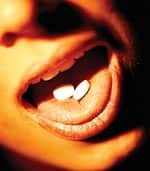Life Extension Magazine®
In an exclusive Life Extension interview, the FDA’s Dr. David Graham explains why he blew the whistle on his own employer, why Vioxx® will not be the last FDA-sanctioned drug scandal, and why only Congress can reform the FDA. On a crisp November day in 2004, Dr. David Graham, a senior FDA scientist, asked members of the US Senate Finance Committee to imagine the unimaginable. “What would you do if two to four aircraft had crashed, killing all aboard, every week for the past five years?” he asked. “What would you want to know? And what would you do about it?” Of course, airline safety was not Dr. Graham’s concern that day. He was referring to the biggest prescription drug scandal in history: the approval and continued use of the pain drug Vioxx®. And he was talking about the campaign of harassment and intimidation waged against him by senior FDA officials when he tried to alert the public to the dangers associated with Vioxx®. Before it was removed from the market in late 2004, Vioxx® had been implicated in about 160,000 cases of heart attack and stroke in the US between 1999 and 2004—the equivalent of 100,000 unnecessary deaths.1 A Catastrophe in the MakingProduced by Merck & Company, Vioxx® belongs to a class of selective nonsteroidal anti-inflammatory drugs, or NSAIDs, called COX-2 inhibitors. These drugs work by reducing an enzyme called cyclooxygenase-2 (COX-2) that is responsible for converting arachidonic acid into prostaglandin E2 (PGE2). A hormone-like substance, PGE2 has been linked to inflammatory diseases, including arthritis. When Vioxx® gained FDA approval in 1999, it was hailed, along with Pfizer’s pain drug Celebrex®, as a miracle drug for people suffering from chronic arthritis. Merck marketed Vioxx® as an effective painkiller that did not cause the gastrointestinal side effects of other common pain drugs such as aspirin or ibuprofen. Even before Vioxx® was approved, however, there were clear warnings that it was linked to heart attack and stroke. Nevertheless, the drug hit the market in a flurry of consumer advertising and favorable media coverage. Between 1999 and 2004, more than 20 million Americans took Vioxx®.2 But the evidence against Vioxx continued to accumulate. Finally, in September 2004, a study was released linking chronic Vioxx® use to increased rates of heart attack and stroke. Merck halted the study early when researchers uncovered the cardiovascular risk associated with Vioxx®. The public outcry was immediate and enormous. In the days following the announcement, Merck’s shares tumbled and the Vioxx® story was front-page news across the country. On September 30, Merck voluntarily withdrew Vioxx® from the market. The company today faces hundreds of lawsuits over Vioxx® and about $2 billion a year in lost revenue. But the fallout over Vioxx® did not stop with Merck. Attention soon turned to the FDA. As the public’s alleged watchdog agency, the FDA is responsible for ensuring that dangerous drugs like Vioxx® do not make it to the market. Yet somehow, Vioxx® had slipped through the system. Worse yet, there were indications that the FDA had actively tried to protect Vioxx® despite evidence that it was dangerous. Even before the drug was approved, an internal Merck study had found a sevenfold increase in heart attack risk associated with low-dose Vioxx®. A year later, another internal Merck study linked high-dose Vioxx® to heart attack and stroke. The company tried to explain away the results, but its argument was unconvincing. Not long afterward, the nonprofit public interest organization Public Citizen recommended that people stop taking Vioxx®. Given its role as a protector of the public, the FDA should have taken action based on this information alone. Indeed, in 2000, after the second Merck study, a mild warning was added to the Vioxx® label concerning the dangers of high-dose Vioxx®. But the agency implemented no ban, and sales of high-dose Vioxx® were not affected. Findings Provoke FDA IntimidationWorried about the mounting evidence against the drug, Dr. Graham, associate director for the Office of Drug Safety and a 20-year FDA veteran, launched a study of Vioxx® in 2001. His team included researchers from California-based Kaiser Permanente and the Vanderbilt University School of Medicine in Nashville, TN. They analyzed data from 1.4 million people in California who had taken Vioxx® between 1999 and 2004. They worked for three years, compiling data. Finally, in early August 2004, almost two months before Vioxx® was removed from the market, Dr. Graham completed the study. The results were explosive—his team found that high-dose Vioxx® increased heart attack risk 3.7-fold, while low-dose Vioxx® increased the risk 1.5-fold.
Dr. Graham prepared his findings for presentation at the International Conference on Pharmacoepidemiology in Bordeaux, France. He concluded that high-dose Vioxx® should not be prescribed or used by patients. As part of normal FDA procedure, he submitted this conclusion for internal review by the FDA. His superiors did not react favorably. “These conclusions triggered an explosive response from the Office of New Drugs,” Dr. Graham told the Senate committee, referring to the FDA office responsible for granting new drug approvals. “The response from senior management in my office, the Office of Drug Safety, was equally stressful.” Instead of acting to protect the public, FDA officials at the highest levels lashed out at Dr. Graham. He was intimidated, pressured to change his conclusions, and forced to delay publication of his study. One senior FDA official even wrote to the editorial board of the prestigious British medical journal The Lancet—which had accepted the study for publication in September 2004—raising questions about the integrity of Dr. Graham’s research. As a result, The Lancet delayed publication of the study for more than three months. Internal emails show that FDA officials even wanted Dr. Graham to send his results to Merck before the study’s release. After being repeatedly attacked by senior staff members at the FDA, Dr. Graham finally responded in an email to Dr. Paul Seligman, director of the Office of Pharmacoepidemiology and Statistical Sciences, stating, “I’ve gone about as far as I can without compromising my deeply held conclusions about these safety questions.” Nevertheless, they had gotten to him. When Dr. Graham presented his findings in France, he had altered his conclusion about high-dose Vioxx®. The FDA later used this as evidence that Dr. Graham had questioned his own research. Agency spokespeople announced that Dr. Graham had “voluntarily” changed his conclusions. According to Dr. Graham, however, the real story was somewhat different. “There’s voluntary and there’s voluntary,” he explained in an exclusive interview with Life Extension. “If someone puts a gun to your head and says, ‘Sign over your house,’ and you sign over your house, that’s technically voluntary.” Dr. Graham said he changed his conclusions because the information was so important that it overshadowed his own convictions. “They weren’t going to allow me to go to France with my conclusion the way it was,” he said. “I decided it was more important to get this information out into the scientific community than to make my conclusion what I really believed. The FDA can maintain it was voluntary, but the fact is, if it was voluntary, the conclusions would have remained.” By attacking Dr. Graham, the FDA was doing everything within its power to withhold this damaging information from the public for as long as possible. Even after Vioxx® was withdrawn, the FDA was slow to act. On November 2, 2004—the day of the US presidential election—the FDA quietly posted Dr. Graham’s study on the Internet. By then, Vioxx® had already been off the market for more than a month.
The Toll: 100,000 Needless DeathsIn Dr. Graham’s view, the FDA is to blame for as many as 100,000 needless deaths due to Vioxx®. Although Merck was responsible for defending its drug in light of the mounting evidence against it, the FDA’s job is to guarantee that prescription drugs approved for sale in the US meet the highest safety standards. By any standard, the FDA failed that responsibility. “The FDA has let the American people down, and sadly, betrayed a public trust,” Dr. Graham told members of the Senate Finance Committee. “We are talking about a catastrophe that I strongly believe could have, should have been largely avoided. But it wasn’t, and over 100,000 Americans have paid dearly for this failure.” As this issue of Life Extension went to press, Dr. Graham was still employed at the FDA. However, he told the magazine that his life has been “surreal” since the Vioxx® scandal broke. His superiors have ostracized him, and every day he has to face the same people who tried to destroy him professionally for simply telling the truth about Vioxx®. “It’s very difficult,” he said. “I periodically have to sit down with supervisors who I knew in November were lying to Congress about me, lying to The Lancet about me, and who tried to prevent my getting protection as a government whistleblower. They were doing hateful things, and now they pretend nothing happened.” But Dr. Graham is also quick to note that this kind of treatment comes only from FDA senior management. “At the staff level, I’m very respected and supported,” Dr. Graham said. “If anything, esteem for me has increased because they realize I told the truth. They know the reality of what we’re dealing with.” The reality is that the FDA has been hopelessly corrupted. The agency’s problems are wide-ranging and fundamental. It will probably require action by Congress to wean the FDA off its reliance on pharmaceutical industry money and to change the defensive institutional mindset of an agency that cannot admit to its own mistakes.
Dr. Graham hopes that his testimony and experience will be the first steps in reforming the FDA—and there are some hopeful signs. Following Dr. Graham’s testimony, Senate Finance Committee Chairman Charles Grassley (R-IA) issued a blistering statement: “Americans rely on scientists at the FDA as front-line defenders to ensure the safety of prescription drugs . . . A giant pharmaceutical company, which announced a voluntary global recall in September, said studies showed the use of its multibillion-dollar Vioxx® could put cardiovascular health at risk. And now it appears the FDA did nothing about mounting evidence that suggested this risk . . . My bottom line is this: The FDA must remember its mission. To put the public health and safety first and foremost. The American people must be the FDA’s first and only concern.” Other signs, however, are less promising. At various times since the Vioxx® scandal broke, FDA officials have “categorically denied” Dr. Graham’s charges or, alternatively, tried to argue that because all prescription drugs pose some degree of risk, the agency was not lax in its oversight of Vioxx®. The road ahead to true FDA reform appears to be long and difficult. | ||||||
Vioxx®: Tip of the Iceberg?The situation might not be so bad if Vioxx® were an isolated case. But it is not. In recent years, other FDA scientists have come forward with their own stories. Unfortunately, the treatment they received was no better than the intimidation directed at Dr. Graham. “I wasn’t surprised at the FDA’s reaction because the tradition at the FDA has been to react negatively to new information that illustrates how the FDA’s policies are inadequate or wrong,” Dr. Graham said. “When you illustrate that the FDA’s policies are harmful, the reaction is negative and immediate.” In fact, Dr. Graham was the second FDA scientist to appear before the Senate Finance Committee in late 2004. The first was Dr. Andrew Mosholder, an FDA epidemiologist who testified last fall that FDA superiors had asked him to soften recommendations concerning antidepressants. In 2004, Dr. Mosholder conducted a meta-analysis of 22 studies on the use of antidepressants in children. His research showed that children who took antidepressants, such as Prozac® and Zoloft®, were twice as likely to become suicidal as children who took a placebo. Once again, however, senior FDA officials intervened before Dr. Mosholder could make his results public. Dr. Mosholder was told to alter his research findings in material that was submitted to Congress, and was threatened with disciplinary action by the FDA’s Office of Internal Affairs if he went to the media. On another occasion, he was barred from testifying at a public hearing on antidepressants and children. And once again, there had been warning signs. According to the Senate investigation, the link between antidepressants and children had been studied since 1996, yet no drug label changes were made and no drugs were taken off the market. “There is something terribly rotten at the FDA,” Rep. Peter Deutsch (D-FL) told the Los Angeles Times after Mosholder’s testimony. “No agency charged with protecting the public health should have behaved with such indifference.”3
The only thing unusual about these cases is that they became public, according to Dr. Graham. In fact, without urgent reform at the FDA, it seems almost inevitable that another Vioxx®-sized disaster will occur. Dr. Graham himself has identified several other drugs that demand immediate action:
Dr. Graham, along with other consumer groups such as Public Citizen, are calling on the FDA to scrutinize other COX-2 inhibitors, such as Bextra® and Celebrex®. In late January 2005, Public Citizen filed a petition with the FDA, demanding that it remove Bextra® and Celebrex® from the market. “The Food & Drug Administration should immediately ban the sale of Celebrex® and Bextra®, which put millions of people, many of them elderly, at risk of heart attack,” said Dr. Sidney Wolfe, director of Public Citizen’s Health Research Group. “These drugs are not only more expensive and more dangerous than older, safer pain relievers, they are no better at protecting the gastrointestinal tract.” Even the FDA’s own scientists lack faith in the agency’s ability to protect the American people. December 2004 saw the release of a previously unpublished FDA internal management review, in which 846 FDA scientists were asked to complete an extensive survey. About half answered. The study found that:
With findings like these, it is no wonder the FDA tried to prevent the survey from ever seeing the light of day. In fact, it might never have been made public if not for the efforts of two public interest groups, Public Employees for Environmental Responsibility (PEER) and the Union of Concerned Scientists (UCS). “Many concerns had been raised about the manipulation of science within the [Bush] administration,” said Suzanne Shaw, UCS director of communications. “There had also been concerns raised at the FDA. In thinking about how to design a tool to get more data, we heard about the survey. But when we tried to see the actual results, we were told we couldn’t see the report.” Eventually, it took a request under the Freedom of Information of Act to pry the report loose from the FDA.
Serving Drug Companies, Not the PublicDr. Graham is certain that without urgent reform, Vioxx® is only the beginning of the disasters that will flow from FDA incompetence and arrogance. Congress must act, because the FDA’s problems are so fundamental that nothing except reform forced on the agency from the outside can work. The basic problem, according to Dr. Graham, is that the FDA does not serve the American public, but instead serves the pharmaceutical industry. Under FDA regulations, pharmaceutical companies submit new drugs to the FDA’s Office of New Drugs. These companies are always racing against time because their drugs are protected by a patent for only 17 years, which includes the time it takes to get the drug approved in the first place. To speed drug approval, the FDA charges fees to pharmaceutical companies during the approval process. The fees help “expedite” the complicated but required evaluation of human and animal studies. This means that the FDA accepts money from the very industry it is supposed to regulate. “You want to be evidence based, but the FDA would rather suspend its judgment so it can better serve its clients: industry,” said Dr. Graham. This process results in a biased flow of information, dictated almost entirely by pharmaceutical companies. During the approval process and afterward, the drug makers are not required to release studies that reflect poorly on their drugs. The real trouble begins, however, once a drug is approved. No matter how extensive the pre-approval process, there is no substitute for experience. In the case of Vioxx®, the drug was approved based on studies involving 5,000 subjects. That may seem like a lot, but it is a tiny fraction compared to the millions who eventually used Vioxx®. Sometimes researchers do not and cannot learn about a dangerous drug until they study the side effects across whole populations of people. Given the way the FDA is structured, however, that almost never happens. Dr. Graham launched a study on Vioxx® after its approval, and that is the exception rather than the norm. In most cases, once drugs are approved, no further steps are taken to ensure their safety. In fact, the FDA culture actively discourages scientists from pursuing safety concerns in approved drugs, according to Dr. Graham. And that goes for the manufacturer as well. “There’s no incentive for the company to do post-marketing studies,” said Dr. Graham. “They’ve already been given a free pass on safety. It’s all downside for the company, and the FDA has no incentive to do post-marketing studies because it only cares about getting new drugs on the market. The FDA’s main client is industry.” As Dr. Graham’s story demonstrates, once questions are raised, the Office of New Drugs is willing to say or do virtually anything—including pressuring its senior scientists to alter their conclusions, and even trying to destroy their careers and reputations—to protect drug company interests. As long as the FDA remains beholden to the pharmaceutical companies, financially and otherwise, it will be unable to protect the American public. Considering the FDA’s recent history, there is no reason to believe the agency can reform itself. The only real hope is that Congress will act to dismantle and rebuild the FDA from the ground up. “Right now, it’s the FDA’s fault, but if it happens again, Congress will be partly responsible,” said Dr. Graham. “I’m an idealist. I hope people can rise above their political philosophy and unite to create a system of drug safety. If they don’t unite, another disaster will come, and it might be a family member of someone in Congress. Then they will become believers. The men and women in Congress need to understand that these are people’s lives.” | ||||
| References | ||||
| 1. Topol EJ. Failing the public health—rofecoxib, Merck, and the FDA. N Engl J Med. 2004 Oct 21;351(17):1707-9. 2. Martinez B. Merck documents shed light on Vioxx legal battles. Wall Street Journal. February 7, 2005. 3. FDA fails to act on information on link between antidepressants, suicide risk in children, say lawmakers. Medical News Today. September 27, 2004. 4. Celebrex linked to higher risk of heart attack, Pfizer says. Legal News Watch. December 16, 2004. 5. Berenson A, Gardiner H. Pfizer says 1999 trials revealed risks with Celebrex. New York Times. February 1, 2005. |





